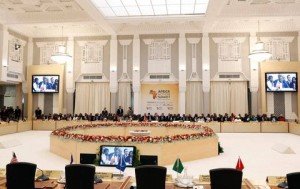The Globe & Mail
Bruce Cheadle
Ottawa
The Canadian Press
The Liberal government’s twin pursuits of expanded foreign markets for Canadian fossil fuels and global action on climate change are getting some unfavourable notice at an international climate summit in Morocco.
The newly elected Trudeau government made a big splash at last December’s United Nations-sponsored COP21 in Paris by helping push aggressive global ambition in the battle against a warming planet.
But while negotiating a national plan with the provinces and territories to cut greenhouse gas emissions, the Liberals have also approved a major liquefied natural gas project in British Columbia this fall and signaled their openness to new oil pipeline proposals.
Environmental advocates attending this year’s COP22 in Marrakech, Morocco, issued a release Wednesday calling out Canada’s competing policy priorities.
“It is a serious concern when we see the international community not honouring their commitments and we are concerned Canada is still pursuing their fossil fuel projects,” Benson Ireri of Christian Aid Africa said in the release. “Developed countries have a moral obligation to honour the Paris Agreement.”
The Philippines-based Global Campaign to Demand Climate Justice also waded in, calling on Canada “to do the utmost that it can in domestic emissions reduction, to stop all expansion of fossil fuels, to do an immediate transition to renewable energy and deliver the finance necessary to keep the world from breaching 1.5 (degrees) Celsius,” said spokeswoman Lidy Nacpil.
Prime Minister Justin Trudeau is set to meet his provincial and territorial counterparts in early December to finalize a pan-Canadian plan for cutting emissions 30 per cent below 2005 levels by 2030. Trudeau has already laid down a marker with the imposition of an escalating $10 per tonne floor price on carbon emissions starting in 2018 and topping out at $50 in 2022.
But in September, the Liberal cabinet approved Malaysian-based Petronas’s massive LNG project for northern B.C., which has clearance to pump 4.3 million tonnes of equivalent carbon dioxide annually into the atmosphere for decades.
Natural Resources Minister Jim Carr has also said the Liberal cabinet will make a decision by mid-December on the proposed expansion of Kinder Morgan’s Trans Mountain oil pipeline from Alberta to Burnaby, B.C.
The Liberals have long been on record supporting TransCanada’s Keystone XL pipeline from Alberta to Gulf Coast refineries. The project was blocked by outgoing U.S. President Barack Obama. President-elect Donald Trump favours approval of the line and he’ll have the backing of a Republican-controlled Congress and House of Representatives once he takes office in January.
Carr signalled this week that even if Trump greenlights Keystone XL, the Liberals still want new Canadian pipeline capacity.
“Well, it doesn’t get oil to export markets in Asia,” Carr told reporters asking about KXL’s revival, “and it’s a goal of the government of Canada to expand its export markets.”
“So there are a set of conditions that we will look at very carefully, but I think that if you listen to what the prime minister has said about moving our resources sustainably, the importance of responding to the demands within other export markets and not to rely solely on one major market, that that’s a sensible approach to take and nothing has changed.”
According to the Canadian Environmental Assessment Agency, the additional 590,000 barrels of oil per day carried by a bigger Trans Mountain pipeline would add upstream GHG emissions of between 14-17 million tonnes of CO2 equivalent per year.
To put those emissions in perspective, a report this week estimated the national floor price on carbon proposed by the prime minister will cut Canada’s emissions by about 18 million tonnes a year when fully implemented in 2022.
“Canada is on a pathway to reduce domestic emissions and meet the 2030 targets domestically while also increasing the amount of fossil fuels it exports,” Catherine Abreu of Climate Action Network Canada said in a release from Marrakech.
“This contradiction is not lost on the countries that are experiencing sea level rise, drought, increased storms and other climate impacts.”








